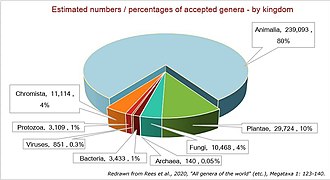Genus

Genus is a taxonomic rank used in the biological classification of living and fossil organisms. It is one of the major ranks in the hierarchical classification system, which includes domain, kingdom, phylum, class, order, family, genus, and species. The genus rank is above species and below family.
Definition[edit]
A genus comprises one or more species that are thought to be closely related. The name of the genus is always capitalized and italicized (e.g., Homo). The species name follows the genus name and is not capitalized but is also italicized (e.g., Homo sapiens).
History[edit]
The concept of genus dates back to the work of Carl Linnaeus, who is known as the father of modern taxonomy. Linnaeus introduced the binomial nomenclature system, which is still in use today. In this system, each species is given a two-part name: the first part is the genus, and the second part is the specific epithet.
Criteria for Classification[edit]
The classification of organisms into genera is based on a variety of factors, including morphological characteristics, genetic similarities, and evolutionary relationships. Modern taxonomists often use phylogenetic studies to determine the relationships between different species and to classify them into appropriate genera.
Examples[edit]
Some well-known genera include:
- Homo - which includes modern humans (Homo sapiens) and several extinct species.
- Pan - which includes chimpanzees and bonobos.
- Canis - which includes dogs, wolves, and other related species.
- Felis - which includes domestic cats and other small cats.
Importance[edit]
The genus classification is important for several reasons:
- It helps in organizing and categorizing the vast diversity of life on Earth.
- It aids in the identification and study of organisms.
- It provides a framework for understanding the evolutionary relationships between different species.
See Also[edit]
References[edit]
<references group="" responsive="1"></references>
External Links[edit]
Ad. Transform your life with W8MD's Budget GLP-1 injections from $49.99


W8MD offers a medical weight loss program to lose weight in Philadelphia. Our physician-supervised medical weight loss provides:
- Weight loss injections in NYC (generic and brand names):
- Zepbound / Mounjaro, Wegovy / Ozempic, Saxenda
- Most insurances accepted or discounted self-pay rates. We will obtain insurance prior authorizations if needed.
- Generic GLP1 weight loss injections from $49.99 for the starting dose of Semaglutide and $65.00 for Tirzepatide.
- Also offer prescription weight loss medications including Phentermine, Qsymia, Diethylpropion, Contrave etc.
NYC weight loss doctor appointmentsNYC weight loss doctor appointments
Start your NYC weight loss journey today at our NYC medical weight loss and Philadelphia medical weight loss clinics.
- Call 718-946-5500 to lose weight in NYC or for medical weight loss in Philadelphia 215-676-2334.
- Tags:NYC medical weight loss, Philadelphia lose weight Zepbound NYC, Budget GLP1 weight loss injections, Wegovy Philadelphia, Wegovy NYC, Philadelphia medical weight loss, Brookly weight loss and Wegovy NYC
|
WikiMD's Wellness Encyclopedia |
| Let Food Be Thy Medicine Medicine Thy Food - Hippocrates |
Medical Disclaimer: WikiMD is not a substitute for professional medical advice. The information on WikiMD is provided as an information resource only, may be incorrect, outdated or misleading, and is not to be used or relied on for any diagnostic or treatment purposes. Please consult your health care provider before making any healthcare decisions or for guidance about a specific medical condition. WikiMD expressly disclaims responsibility, and shall have no liability, for any damages, loss, injury, or liability whatsoever suffered as a result of your reliance on the information contained in this site. By visiting this site you agree to the foregoing terms and conditions, which may from time to time be changed or supplemented by WikiMD. If you do not agree to the foregoing terms and conditions, you should not enter or use this site. See full disclaimer.
Credits:Most images are courtesy of Wikimedia commons, and templates, categories Wikipedia, licensed under CC BY SA or similar.
Translate this page: - East Asian
中文,
日本,
한국어,
South Asian
हिन्दी,
தமிழ்,
తెలుగు,
Urdu,
ಕನ್ನಡ,
Southeast Asian
Indonesian,
Vietnamese,
Thai,
မြန်မာဘာသာ,
বাংলা
European
español,
Deutsch,
français,
Greek,
português do Brasil,
polski,
română,
русский,
Nederlands,
norsk,
svenska,
suomi,
Italian
Middle Eastern & African
عربى,
Turkish,
Persian,
Hebrew,
Afrikaans,
isiZulu,
Kiswahili,
Other
Bulgarian,
Hungarian,
Czech,
Swedish,
മലയാളം,
मराठी,
ਪੰਜਾਬੀ,
ગુજરાતી,
Portuguese,
Ukrainian